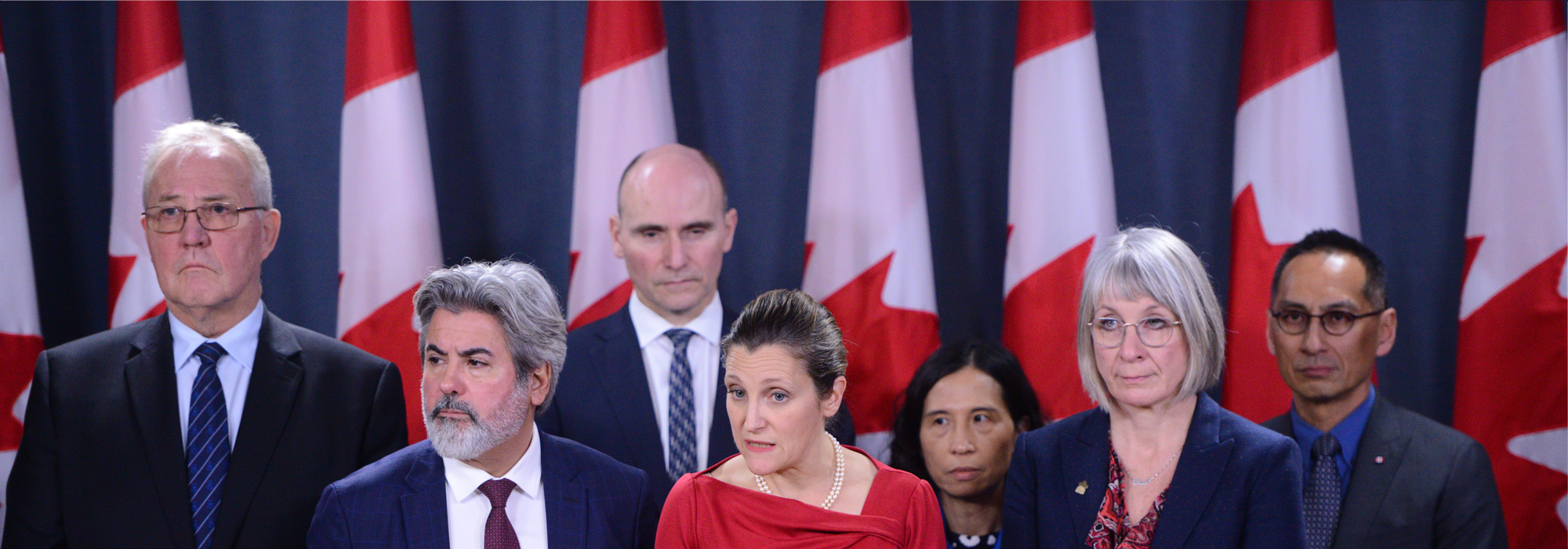
As the dust settled after 9/11 and officials took stock of what had happened, a singular mission took hold across the West, embodied in the refrain “never again.“ In the coming months, as the federal government begins to assess how we were caught so unprepared for the COVID-19 pandemic and searches for ways to avoid a repeat, there will be a unique opportunity to reconsider Canada’s security priorities. Until that exercise is complete, officials must resist the urge to shoehorn the current crisis into the existing mandate of the national security and intelligence community.
In recent weeks, some Canadian scholars and analysts have suggested that the spread of COVID-19 in Canada amounts to either an intelligence failure or a failure of early warning. To prevent a repeat, they argue, the Government of Canada must recognize pandemics as national security issues. They propose enhanced roles for our national security agencies in managing the current pandemic and identifying and preventing future outbreaks.
In so doing, some have made comparisons to the intelligence failures that led to 9/11. While we agree that we should draw on lessons learned from Canada’s response to that crisis, most notably the need for a whole-of-government strategy, we add our voices to those cautioning against the securitization of public health.
CSIS, the agency primarily responsible for collecting and analyzing national security intelligence for government decision-makers, is a creature of statute. As such, its governing legislation defines its mandate. Under the CSIS Act, the service may only investigate and take measures to reduce “threats to the security of Canada,” which includes sabotage and espionage, foreign influence activity, terrorism and subversion. Unless a threat falls into one of these categories, CSIS has no authority to engage in intelligence collection activities.
There is no principled way to characterize a naturally occurring public health threat in a way that qualifies it for investigation by CSIS.
While this definition may be too narrow for some, there is a risk in expanding CSIS’s mandate too broadly. Canadian law already has an example of what happens when we try to define national security in a way that encompasses every imaginable threat.
The Security of Canada Information Disclosure Act‘s definition of the “activities that undermine the security of Canada” is widely decried as being so broad that it is hard to identify what human or national security risk is not captured by it. Or, as we teach our students: when everything is “national security,” nothing is.
Without a clear articulation of national security threats, the task of prioritizing the use of Canada’s limited resources is far more challenging. What is more, the plate of the intelligence community is already full. Adding new lines of operation would inevitably lead it to neglect current priorities such as the growing threats of foreign interference, economic espionage and right-wing terrorism.
So, if securitizing pandemics, that is, reconceiving the spread of disease as a “national security” threat, is not the optimal way ahead for the government, what is?
Global emergencies like the COVID-19 pandemic and the climate crisis deserve a whole-of-government response, meaning a joint effort across government agencies and ministries to provide comprehensive solutions. There is precedent for this, not a wholly successful one, but one from which we can learn useful lessons.
In the post 9/11 era, Canada met the call of “never again” by passing the Anti-Terrorism Act, 2001, giving law enforcement new tools and creating a laundry list of new terrorism offences.
We deployed our armed forces to fight a bloody war in Afghanistan and built up new special-forces units to target the enemy beyond our borders. We engaged in a significant reorganization of government, including the establishment of Public Safety Canada.
In 2004, the government published its first and only ever National Security Policy, refocusing the energy and resources of Canada’s security agencies on the threat of foreign-based Islamic terrorist organizations.
Fortunately, the threat of foreign terrorist attacks did not manifest in Canada as it did elsewhere. However, Canada’s heavy-handed response did have unforeseen consequences. Results included the indefinite imprisonment of five non-citizens and permanent residents without trial, contributing to the torture of Canadian teen Omar Khadr in Guantanamo Bay, and sharing erroneous information leading to the extraordinary rendition of Mahar Arar from the U.S. to Syria where he was tortured
Moreover, as our security agencies and departments focused on the external threat, they failed to identify and prevent hundreds of Canadians from leaving the country to join ISIS and other foreign terrorist organizations responsible for egregious atrocities on innocent populations. More broadly, the overreaction to terrorism led to the neglect of other emerging threats.
It took 17 years, but Canada’s 2018 National Strategy on Countering Radicalization to Violence finally acknowledged that the terrorist threat is often tied to social grievances and vulnerabilities within Canadian society. Today, we understand that preventing terrorism requires a multi-agency approach that goes far beyond hard security and includes civil-society actors, mental health practitioners, social workers and educators.
Canada’s response to 9/11 exemplifies the need to avoid the narrow securitization of a problem without fully assessing the underlying social and structural factors that make it a threat to Canadians. It also highlights the necessity of better cooperation within the federal bureaucracy, as well as with other levels of government and international partners. Breaking down these walls does not come easy. Many unnecessary barriers remain today, despite the progress brought about since 2001.
What does this mean in terms of the national security and intelligence community’s role in dealing with pandemics? Adding more offences to the criminal code, further militarizing our borders or enhancing the surveillance capabilities of our spy agencies may make us safer from viruses, but risks compromising our Canadian values and way of life.
The global monitoring of current and future pandemics is primarily the job of the Public Health Agency of Canada (PHAC). We’ve yet to hear a compelling reason to change that. However, there may be novel yet supporting roles for security and intelligence agencies working alongside PHAC.
They can, for example, assess how adversaries are affected by the pandemic (are they weakened or strengthened? will they try to exploit the crisis?) and help combat disinformation. Enhanced collaboration with PHAC is another obvious avenue for growth. The government may also choose to boost the resources of the medical intelligence unit within defence intelligence. Crucially, none of this involves fundamentally changing their existing mandates.
Expanding the responsibilities of national security and intelligence agencies too far beyond the supporting roles already discussed would distract from current priorities, lead to wasteful duplication of scarce resources and inevitably result in adverse second-order effects that arise when social issues are unnecessarily securitized.
Almost two decades later, the world is once again crying out: “never again.” The whole of the Canadian government must respond to that call, but in doing so cannot forget the lessons of the past.
This article is part of the The Coronavirus Pandemic: Canada’s Response special feature.
Photo: Public Safety Minister Bill Blair (left to right), Government House leader Pablo Rodriguez, Treasury Board President Jean-Yves Duclos, Deputy Prime Minister Chrystia Freeland, Canada’s chief public health officer Dr. Theresa Tam, Health Minister Patty Hajdu and Dr. Howard Njoo, deputy chief public health officer attend a news conference on the coronavirus situation at the National Press Theatre in Ottawa on March 13, 2020. THE CANADIAN PRESS/Sean Kilpatrick











